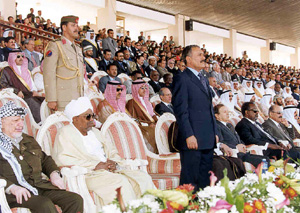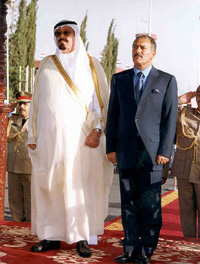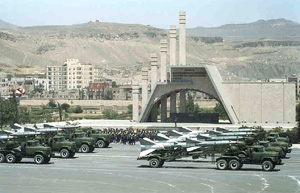
22 May Festivities Excel! [Archives:2000/22/Law & Diplomacy]
May 29 2000
Prepared by
Ismail Al-Ghabiry

It is worth noting that the most spectacular show of all was the traditional parade show of hundreds of traditionally dressed men who danced waving their ‘jambia’s and swords. The most amazing element was the extremely well-organized movements of all of these men, who displayed wonderful dances with very elegant harmony and preciseness, something not seen often in Yemeni displays. Not to forget the Lahj dressed ladies who added an extra delightful touch to the display. After the traditional display came the military display, which according to many guests was the “most boring and lengthy part” of the parade. Troops from the army, navy, and air force in thousands marched in front of the guests in their diverse colorful customs. The final display was of the tanks, armored personnel carriers and other military vehicles carrying all sorts of rockets, missiles, and cannons, which were slowly passing in front of the memorial to the unknown soldier, expressing the strength and military power of the country.

The Arab and the World Media Share Yemen’s Joy on its National Day
The Yemeni people on Monday, May 22 celebrated the 10th anniversary of their unity which was one of the most important chapters in their contemporary history; it proved to the entire world that they are capable of eliminating all forms of partition. They also proved to have put an end for good to a long historical epoch full of bitterness, pains and suffering as well as conflicts. A large number of the Yemenis’ Arab brethren, friends, high-ranking officials and guests, came to Yemen to take part in the celebrations. High-level delegations included heads of state and government, parliamentarians and ministerial-level delegations. This is a manifestation and a demonstration expressing strong support for the unity and a vindicator towards the people’s and the government’s of Yemen in their pursuit of excellence. In this report the Yemen Times reviews how the Arab and the foreign media carried their stories on the celebrations. The opinions and analyzes do not necessarily express the paper’s viewpoints but rather of the media concerned.

Kuwait has also contributed to solving internal problems of Yemen following the independence of the formerly South Yemen and the establishment of a socialist regime. This is despite the problems between the two countries, especially during the seventies which led to war in 1979 and 1987.
The Jordanian news agency Petra has carried excerpts from president Ali Abdullah Saleh’s speech screened on the occasion, focusing on his call for an agreement on a mechanism to establish a new Arab order for a one nation with multi systems, guaranteeing the realization of economic integration and encouraging investment of Arab capital inside the Arab world. Its aim is to achieve consolidation of Arab interests leading to prosperity and maintenance of Arab relations.
The Qatari news agency focused on president Saleh’s call for the elimination of tension ensuring security and stability in the Middle East region by establishing a regional security order based on mutual confidence and understanding, an order that can lead to resolving disputes, especially border issues by peaceful dialogue, direct understanding or arbitration according to the international law.
The French news agency stressed the president’s emphasis that the economic development would receive a top priority of the government in the next five years during the 5-year plan 2000-2005. It quoted the president in this regard as saying that among the future priorities would be continuing the efforts for economic development improvement of the citizens’ living conditions, enhancement of national economy, paying attention to tourism and investment, reduction of unemployment rate and creation of job opportunities, extension of social security network and implementing programs of the second 5-year plan 2000-2005.
Al-Jazeera Satellite Channel of Qatar gave prominence to the president’s confirmation that economic reform would have special attention in the coming five-year plan.
As for the Saudi news agency, it concentrated on the paragraph of the president’s speech pertaining to the Yemeni-Saudi relations, quoting him as affirming that efforts are continuing for reaching a solution acceptable to both the countries concerning their common borders in a manner to be respected by the coming generations.
On the other hand, prime minister Dr Abdul Karim Al-Eryani told London Radio correspondent that the Yemeni unity had created a strategic situation for the unified state and led to the end of a seminary of permanent conflict and tension that continued from 1970 till 1990. He added that the unity had been achieved by the will of the people of Yemen.
Kuwaiti newspapers reported last Tuesday that during the celebrations of the Yemen unity, Kuwait’s foreign minister Sheik Sabah Al-Ahmed Al-Jaber and the Palestinian president Yasser Arafat embraced each other in a gesture indicating a big change in Kuwait’s attitude after ten years of lukewarm relations with the Palestinian leadership.
The Qatari newspaper Al-Raya praised in an editorial Qatar’s participation in the celebrations by a delegation headed by the crown prince Sheik Jassem Ben Hammad Al-Thani, describing the occasion as a good opportunity realignment among the Arab brethren.
The Libyan TV channel broadcast an analysis mentioning that realization of Yemen’s unity had been an outcome of the steady efforts unleashed by the Libyan leader; the Libyan leadership called for the necessity and inevitability of Yemen’s unity that culminated in the Sanaa charter signed in Tripoli, Libya on July 26 1972. It described the unity as a fitting response to the imperialist conspiracies aimed at stabilizing regional partition and artificial borders.
The Syrian news agency quoted the Russian defense minister Igor Surgeyev, who represented his country in celebrations of Yemen’s unity, as announcing that his country was ready to develop its relations with the republic of Yemen and the Arab countries in general.
In Cairo, Sawt Al-Arab Radio broadcast a report saying that apart from the unprecedented celebrations held in the capital Sanaa and other Yemeni cities, the Yemenis had, throughout the past ten years, traversed a long distance to overcome economic hardships, and to stabilize security, settle relations with neighborly countries following closure of borders and complete institutional tasks for building the new Yemen.
The ANN TV channel said that amidst a massive Arab presence, Yemen celebrated the 10th anniversary of its unity where around 100 thousand military men and civilians took part in a parade held in the presence of president Ali Abdullah Saleh.
The Qatari English-language newspaper said in a commentary that Qatar’s participation in Yemen’s celebrations by a delegation led by Qatar’s Crown prince was an indication of its support to the unity move and the depth of the Qatari-Yemen relations.
——
[archive-e:22-v:2000-y:2000-d:2000-05-29-p:./2000/iss22/l&d.htm]


